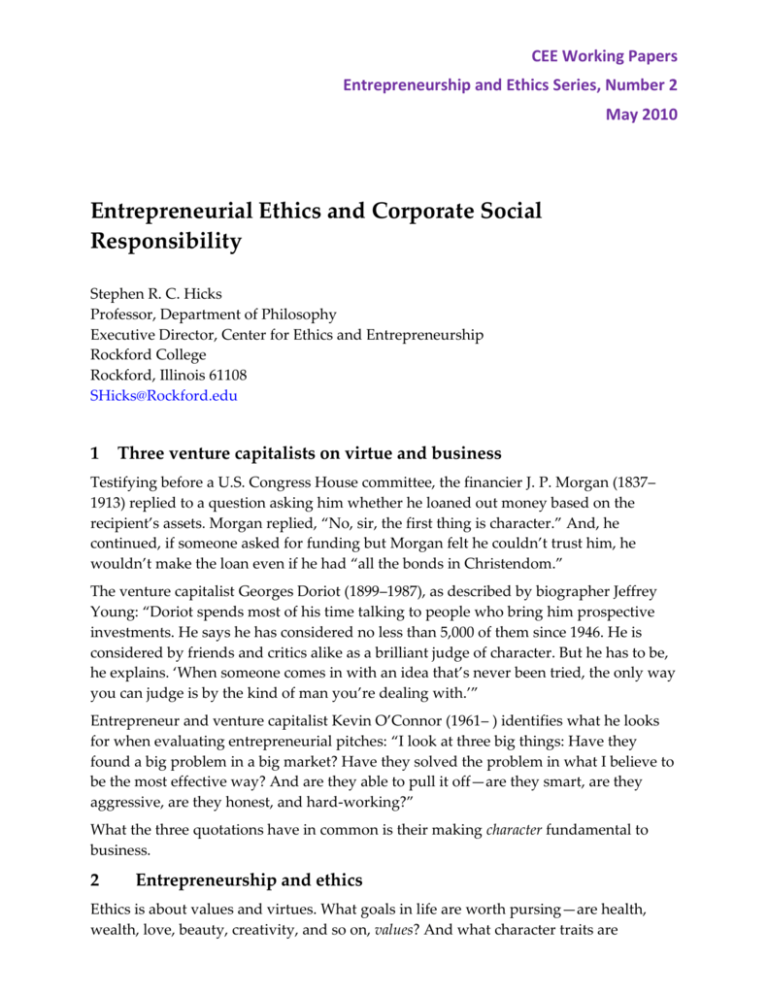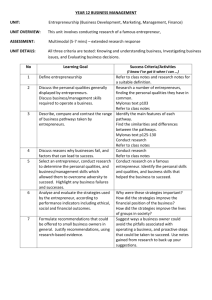CEE-WorkingPaper-2-CSR
advertisement

CEE Working Papers Entrepreneurship and Ethics Series, Number 2 May 2010 Entrepreneurial Ethics and Corporate Social Responsibility Stephen R. C. Hicks Professor, Department of Philosophy Executive Director, Center for Ethics and Entrepreneurship Rockford College Rockford, Illinois 61108 SHicks@Rockford.edu 1 Three venture capitalists on virtue and business Testifying before a U.S. Congress House committee, the financier J. P. Morgan (1837– 1913) replied to a question asking him whether he loaned out money based on the recipient’s assets. Morgan replied, “No, sir, the first thing is character.” And, he continued, if someone asked for funding but Morgan felt he couldn’t trust him, he wouldn’t make the loan even if he had “all the bonds in Christendom.” The venture capitalist Georges Doriot (1899–1987), as described by biographer Jeffrey Young: “Doriot spends most of his time talking to people who bring him prospective investments. He says he has considered no less than 5,000 of them since 1946. He is considered by friends and critics alike as a brilliant judge of character. But he has to be, he explains. ‘When someone comes in with an idea that’s never been tried, the only way you can judge is by the kind of man you’re dealing with.’” Entrepreneur and venture capitalist Kevin O’Connor (1961– ) identifies what he looks for when evaluating entrepreneurial pitches: “I look at three big things: Have they found a big problem in a big market? Have they solved the problem in what I believe to be the most effective way? And are they able to pull it off—are they smart, are they aggressive, are they honest, and hard-working?” What the three quotations have in common is their making character fundamental to business. 2 Entrepreneurship and ethics Ethics is about values and virtues. What goals in life are worth pursing—are health, wealth, love, beauty, creativity, and so on, values? And what character traits are necessary to achieve those good things—are honesty, courage, perseverance, fairness, and so on, virtues? In the past generation, while more attention is being given to entrepreneurship as an economic phenomenon,i entrepreneurship has received much less attention as an ethical phenomenon. Yet entrepreneurship is a value-laden enterprise. As a business activity, entrepreneurship demands resourcefulness and resilience, risk tolerance and courage, and it can be a vehicle for achieving important financial and other personal goals. In this essay, I sketch an entrepreneurial ethics, explore its implications for the foundations of business ethics, and contrast it to a currently dominant paradigm for business ethics, i.e., Corporate Social Responsibility. 3 The values of entrepreneurship What does it mean to see entrepreneurship as an ethical phenomenon? Let’s approach the question by first asking why we work. Some people work because they must; others work because they want to. Unless one is born into wealth or wins the lottery, making a living is foundational to life. Hence most of us must work to sustain our lives at least to a minimum level. But beyond a bare making a living, work is be a means of achieving many goals—financial security, creative expression, sociability, and even adventure. Many of those who do not have to work often find their work to be a vehicle for pursing those goals. One basic work choice is to go to work for an existing business, i.e., to become an employee, or to go into business for oneself, i.e., to become an entrepreneur. So let us ask, secondly: Why do some choose entrepreneurship over working for others? Their reasons can be negative—there may be no employment opportunities available so entrepreneurship is the best available option. Or their reasons can be positive—they believe that as entrepreneurs they can achieve greater wealth, autonomy, and selfexpression. Wealth: Entrepreneurs typically have ownership positions in their businesses and thus a chance at greater earnings than salaried or hourly employees. That wealth in turns means a chance at greater financial security and all the good things that money can buy. Autonomy: Entrepreneurs are deciders and initiators. Consequently, they have greater power over their thoughts and actions and more flexibility in the use of the time than most employees. Expressed negatively, autonomy means not having to take orders from bosses, being more easily able to avoid bureaucracy, office politics, and so on. Self-expression: Entrepreneurs build businesses from the ground up, typically generating the idea and making it happen. As a result, entrepreneurs typically experience stronger psychic ownership of their businesses. Their business is My idea done my way. Put negatively, entrepreneurs do not experience their work life as being a cog in someone else’s machine. Entrepreneurship, accordingly, is a vehicle for the pursuit of several important physical and psychological human values: wealth, autonomy, and self-expression. Of course, as an employee one can realize those values, yet entrepreneurship makes those values central and more likely to be realized. Further: entrepreneurs trade with others when purchasing raw materials, when selling to customers, and when they hire employees to help grow the business. Entrepreneurs create new networks of voluntary traders, and they enter into and maintain alreadyexistence networks. Trading networks are also a great human value, and they are based upon mutual commitments to deal with each other on the basis of voluntary exchange, rather than, say on the basis of treating the other as an object of charity or plunder. Accordingly, entrepreneurship is based upon several value commitments: the importance of autonomy, self-expression, voluntary trade, and the creation and enjoyment of wealth. 4 The virtues of entrepreneurshipii If entrepreneurship is a value-oriented enterprise, what virtues make that enterprise successful? That is to say, if one is to achieve practical business success, what character traits must one strive to embody and make habitual? Let us consider a typical entrepreneurial process, and note the italicized concepts in the following description. Entrepreneurship begins when someone has a new business idea.iii The entrepreneur is ambitious and exhibits guts in taking the initiative in developing the idea into a new enterprise.iv Typically through experimentation and perseverance, the entrepreneur produces something of value. The entrepreneur then becomes a leader by convincing customers of the new product’s value and by teaching new employees how to make it. The entrepreneur and customers and the entrepreneur and the employees trade to win-win results. The entrepreneur has achieved a measure of success and then is able to enjoy the fruits of his or her achievement. What does this sketch of the entrepreneurial process have to do with virtue? Virtues are action-guiding character traits that aim at good results. So if we cash out the above italicized entrepreneurial-process traits in terms of virtues— i.e., in terms of character traits and commitments that enable and constitute good action—then we make the following connections: The entrepreneur’s generating new business ideas connects to the virtue of rationality. Rationality is the commitment to the exercise of one’s capacity for reason. The entrepreneur’s coming up with a business idea, evaluating it, and planning to make it real require the exercise of rationality. The entrepreneur’s ambitious drive for success connects to the virtue of pride. Pride can be based upon past accomplishments, but it can also be future-oriented—wanting to be the best one can be and not settling for less. The entrepreneur’s ambition is his or her taking pride in the business part of his or her life. Entrepreneurial initiative connects to the virtue of integrity. Integrity is a commitment to acting on the basis of what one believes to be true and good. If the entrepreneur believes a business idea to be good, then the activity of making the ideal a reality integrates thought and action. The risk of failure is a feature of entrepreneurship, and fear is a natural response to the possibility of failure—of losing money, losing self-esteem, and losing respect from others. So the gutsiness that entrepreneurial action involves connects to the virtue of courage. Courage is acting to achieve what one thinks is good even when one is aware of the possibility of failure. The entrepreneur’s working through experimental process of product development connects to the virtue of objectivity. To be objective means judging based on one’s awareness of the facts, being open to new data (including unwanted negative data). An element of objectivity is the virtue of intellectual honesty, that is, a commitment to recognizing the facts of the matter for what they are. The entrepreneur’s perseverance through difficulties, disapproval, and self-doubts connects with the virtue of independence. Independence is the virtue of trusting one’s own judgment and acting on the basis of one’s best judgment despite frustrations, distractions, or the negative opinions of others. The entrepreneur’s productivity, i.e., his or her sticking with it until the job is done, connects to the virtue of productiveness. Productiveness is a commitment to creating value, to being self-responsible for bringing into existence that which one needs or wants. The network of traits that make for effective leadership are complex and variable. Yet through whatever individual capacities and personality traits, entrepreneurs must demonstrate to others the value of the new business’s products or services, convince customers and investors to commit funds, and teach employees how to perform the business’s functions. Entrepreneurship necessarily involves a commitment to leadership. The entrepreneur’s trading to win-win results with customers and employees connects to justice. The virtue of justice entails a commitment to evaluating and interacting with others according to merit. In a business context of voluntary deals, justice means that each party judges the merits of trade independently and agrees voluntarily to the terms of the trade, and follows through accordingly. And, finally, the entrepreneur’s achieving and enjoying success, both the physical and psychological rewards that business achievement can bring, connect to the general moral values of flourishing, happiness, and fulfillment. As the entrepreneur’s business life is a component of his or her overall life, the entrepreneur’s engaging in the actions that lead to flourishing in business is a component of an overall flourishing life. In Aristotelian terms, the entrepreneur’s actions both constitute and lead to a life that is fully realized. Summarizing all of the above in a table, we get the following: Table 1: Entrepreneurial Traits and Moral Virtues. Entrepreneurial Traits Moral Virtues New ideas Rationality Ambition Pride Guts Courage Initiative Integrity Perseverance Independence Experimentalism Objectivity (including honesty) Productivity Productiveness Leadership Leadership Win-win trade Justice Entrepreneurial Consequences Experiencing success: wealth, autonomy, self-expression 5 Moral Values Self-esteem, Happiness, Flourishing Entrepreneurial ethics as a business ethics code The virtues constituting the table’s right column embody an entrepreneurial code for business ethics. That set of virtues describes entrepreneurial activity abstractly. Conversely, the success traits of entrepreneurs in the table’s left column are particulars of a general set of virtues that can be applied in all walks of life.v Relevant questions, then, for the business ethics of entrepreneurship are: (a) What are the values of entrepreneurship, upon which all successful business is based? (b) What are the character virtues of entrepreneurship that enable successful business? (c) How do we teach and inspire those values and virtues in students and business professionals? Now for some implications. One implication is that approaching business ethics via entrepreneurship connects business to ethics positively and organically. The virtues and values embedded in the practice of entrepreneurship sets a foundation for a business ethic based on the assumption that successful business practice has within it the resources to develop an ethic. That approach contrasts to the assumption often made that ethics is alien to business and must be grafted on or imposed from without. Another implication of an entrepreneurial ethic is that business ethics should focus first on creativity, productivity, and trade. That is, it should not take those elements take them for granted or as amoral givens. If the basis of business is creative productivity and trade, then the basis focus of business ethics should be upon that which enables individuals to be or become creative producers and traders. A third set of implications emerge when we contrast an entrepreneurial business ethics to the dominant model of business ethics for the past half-century, i.e., “corporate social responsibility” (CSR). 6 Entrepreneurial Ethics contrasted to Corporate Social Responsibility Corporate Social Responsibility’s three constituent words indicate its three framing assumptions as a model of business ethics: 1. The first tells us that corporations are our model of business practice to analyze and prescribe to. 2. The second word tells us that the social is our focus. 3. In the literature, responsibility is usually cashed out in terms of avoiding harm and distribution to others. Or it is interpreted conjunctively with the second word to mean social responsibility. On corporations as the standard model: The vast majority of examples in business ethics focus on large, well-known corporations—Walmart, Microsoft, Enron, McDonald’s, and so on—and much of the business governance literature focuses upon corporate governance, with its hierarchical structure. Yet the corporation is not the only business type or even the most plentiful type. Firms can be organized as sole proprietorships, partnerships, or corporations, and US Census Bureau data indicate that large corporations are a fraction of overall business activity: “About three quarters of all U.S. business firms have no payroll. Most are self-employed persons operating unincorporated businesses” (U.S. Census Bureau, 2007). Further, in 2007 there were 27,757,676 firms in the U.S., but the number of firms with more than 100 employees was approximately 126,000, which is about one-half of one percent. What these numbers suggest is that the business ethics literature’s focus on mature, large corporation obscures the reality of the business environment that most people experience. Most businesses are small businesses and closer to their entrepreneurial roots. Further, every corporation begins as an entrepreneurial venture. Many such ventures perish, a few go on successfully, and only a very few become large. But there is a value to understanding businesses causally. The basic principles of business—buying and selling, hiring, firing, and quitting—including its moral principles, are in place from the beginning. So a focus on entrepreneurship enables us to articulate those moral principles at the foundation of business activity and then to see how they develop as the business grows in size and complexity. On the social focus: CSR typically assumes, as in the following example from the Committee on Economic Development, that business exists to serve social purposes, often top-down social purposes: “business functions by public consent and its basic purpose is to serve constructively the needs of society—to the satisfaction of society” (Carroll 1999). Such formulations do not mention individuals and assume that the social has priority over the individual. Yet it is not clear that this is the reality or importance of business. The basic business transaction is that between a buyer and a seller: two individuals come together, each bringing value to the transaction, and they go their separate ways after to enjoy the results of the transaction. Before buyers and sellers can trade, each has to engage in productive work, and productive work is basically individual. An individual wakes up in the morning, decides to get out of bed and go to work. He or she makes dozens of decisions and performs hundreds of particular actions in the course of a day. At work, those actions add up to productivity, the results of which enable the person to become a buyer or a seller. Entrepreneurial ethics highlights this individuality of business: entrepreneurial activity is primarily individual. It starts with an individual’s idea, an individual’s productive efforts, and then develops into a social network of value-adding individuals producing and trading with each other. What we call firms, markets, and other relevant social groupings are associations of individuals adding value together. Such social groupings are formed bottom-up and remain in existence as long as they serve mutually the interests of the individuals involved. So while social interaction is an important part of business ethics, it is consequent. A business ethic based on entrepreneurialism makes issues of individuality primary and issues of sociability secondary. On responsibility as avoid-harm and distribution: In CSR, the broad concept of responsibility is typically given two sub-meanings. One meaning is avoiding harm to others—e.g., not engaging in fraud, not damaging others’ property, and so on. The other is to engage in charitable or redistributionist activities—for example: “Traditionally in the United States, CSR has been defined much more in terms of a philanthropic model. Companies make profits, unhindered except by fulfilling their duty to pay taxes. Then they donate a certain share of the profits to charitable causes. It is seen as tainting the act for the company to receive any benefit from the giving” (Baker 2011). While there certainly are places for anti-harm and philanthropic principles in ethics, from an entrepreneurial perspective this concept of responsibility is narrow and secondary. CSR typically makes no explicit mention and certainly does not emphasize the priority of productivity as a moral responsibility. By contrast, the focus of entrepreneurs first and foremost is upon production, not philanthropy; and entrepreneurs are focused upon creating value, not avoiding harm. How can I create value? is the operative question. Or in other words: How can I be more productive? or How can I make money? (with an emphasis upon the make). Creating, producing, and making are primary. One reason for this is that causally production comes before distribution. Before we can ask the distribution question of Who gets what?, the what has to be brought into existence. That is the basic responsibility. Before one can make a distribution claim on the value a business has created, one must have productively contributed to the creation of that value. The issue of distributive justice falls out of the productivity: A fair determination of who gets how much depends upon each person’s productive contribution. While entrepreneurial ethics makes our responsibilities to be creative producers primary, CSR’s emphasis on distributive responsibilities, especially charitable distributions overlooks the morally and causally prior productive responsibilities. The same point about moral priorities applies to the avoidance of harm. Part of successful productivity is not harming the legitimate interests of others while achieving one’s own goals, but the focus is on the positive creation not the non-harm. By analogy, if one’s goal is to travel from New York to Los Angeles, one’s focus is upon successful transportation; one’s primary focus is not upon not harming Nebraskans along the way. To summarize in abstract terms, the avoid-harm principle says that we should not engage in win-lose interactions with others, and the redistribution principle says that we should engage in lose-win interactions. What is missing is the great moral import of making possible win-win interactions. Entrepreneurial ethics makes first our responsibilities as individuals to be productive traders. The dealings of productive traders are neither harmful (win-lose) nor charitable (lose-win). Instead, they are win-win. The morality of productiveness is prior to the morality of distribution. So business ethics should be focusing first and predominantly on self-responsible productiveness and the social conditions that foster it. 7 Conclusion While entrepreneurship is beginning to receive attention in the business ethics literature, it has the potential for refocusing our attention to business fundamentals. The questions, in the contrasts between traditional CSR and entrepreneurial ethics, are: Should we focus first upon start-ups and innovative firms, or upon mature corporations? Should we focus upon individuals first, or upon the social? Should we focus upon production and trade first, or upon harm-avoidance and charity? What entrepreneurial ethics suggests is: Do not start business ethics with corporations. Do not start with the social. And do not start with philanthropic accounts of responsibility. Instead, start by making morally foundational those productive individuals who engage in win-win trade, and build from there to the increasingly complex social structures the business world creates. References Aristotle (1984), Nicomachean Ethics. In The Complete Works of Aristotle, edited by Jonathan Barnes. Princeton: Princeton University Press. Baker, Mallen (2011), “Corporate Social Responsibility—What Does It Mean?” http://www.mallenbaker.net/csr/definition.php. Accessed 8 May 2010. Baumol, W. J. (2010), The Microtheory of Innovative Entrepreneurship. Princeton: Princeton University Press. Carroll, Archie B. (1999), “Corporate Social Responsibility: Evolution of a Definitional Construct.” Business Ethics Quarterly 38:3, 268-295. Hicks, Stephen (2009). “What Business Ethics Can Learn from Entrepreneurship.” Journal of Private Enterprise, 24(2), 49-57. Kirzner, Israel (1973), Competition and Entrepreneurship. Chicago: University of Chicago Press. Knight, Frank (1921), Risk, Uncertainty, and Profit. Boston: Houghton Mifflin Co. O’Connor, Kevin (2009), Interview on “Entrepreneurship and Venture Capital.” Kaizen No. 6. http://www.ethicsandentrepreneurship.org/20090429/interview-with-kevin-oconnor/. Accessed 3 May 2010. Rand, Ayn (1964), “The Objectivist Ethics.” In The Virtue of Selfishness. New York: New American Library. United States Census Bureau (2007), http://www.census.gov/econ/smallbus.html. Accessed 18 May 2010. Baumol (2010) notes: “Entrepreneurs are widely recognized for the vital contributions they make to economic growth and general welfare, yet until fairly recently entrepreneurship was not considered worthy of serious economic study.” ii This section builds upon Hicks (2009). iii Kirzner (1973) makes this aspect of the entrepreneurial process the defining aspect. iv Knight (1921) makes this aspect of the entrepreneurial process the defining aspect. v This list of virtues integrates those found in Aristotle (1984) and Rand (1964). i






